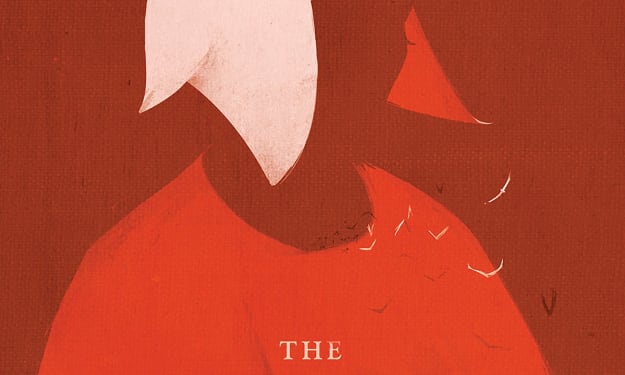
Disclaimer: I do not own The Handmaid's Tale or any of its properties. Reviews and analyzes are allowed under the Fair Use Act. Any discussion of religious overtones pertain solely to the themes and motifs of the novel and do not reflect my personal beliefs.
CHAPTER EIGHTEEN
This is another Night chapter, which are the ones that are more introspective and abstract than the rest of the narrative. Offred recovers from the Ceremony, describing herself as "the sound of glass" and the word "shatter". This could possibly be a metaphor for how fragile she feels in this regime, how she's being used and dehumanized. She wants so desperately to grasp ahold of some small hope of autonomy that all women have lost in Gilead.
She has a flashback to being pregnant with her daughter. She and Luke are lying down to rest during a thunderstorm. She laments the lack of physical affection, calling it a "lack of love". She compares the people she once loved to effigies of saints, illuminated by candles used for prayer. She wants someone to hold. She contemplates masturbating, but regards her sex as "white, hard, and granular" and a "plateful of dried rice". Her body was once her own, thriving with her sexuality, but now self-pleasure is seen as a sin. She compares her body as a "room where things once happened and now nothing does, except the pollen of the weeds that grow up outside the window, blowing in a dust across the floor." This could be a dig at the Commander about his alleged sterility, with the weeds symbolizing something unwanted as weeds are in a garden.
You might notice that for a pronatalist regime, Gilead is certainly not pacifist. The Narrator gives a comparison of the human body rather crudely: "The body is so easily damaged, so easily disposed of, water and chemicals is all it is, hardly more than a jellyfish, drying on sand." She and other Handmaids have been brainwashed into the belief that human life is disposable unless it benefits the regime, which is an oddly counterintuitive attitude for such a pro-life movement. In reality, Gilead's goals are to curb the fertility crisis under their own terms, to increase their power and to ensure their ethnostate prevails. They value boys over girls because they are more potential soldiers to add to the frontlines. They only value girls as means to produce more white babies for the regime and, as we'll learn in the sequel, The Testaments, to provide young child brides for high-ranking personnel to abuse and produce more white babies.
The Narrator experiences cognitive dissonance, believing that Luke has either been killed and left in a field to rot, captured by the regime and held as prisoner, or escaped by the hand of some rebels. She invents an outcome for each scenario, believing in all of them simultaneously because that is how she copes with not knowing. She thinks of the words "In Hope" inscribed on a gravestone, wondering why that would be written for a dead person. It could be a hope that the deceased soul went to Heaven or the people who loved them will see them once again in the afterlife. The Narrator wonders if Luke is still alive and if he still hopes like her that one another survived.
CHAPTER NINETEEN
The Narrator dreams of being back in her old home and that her daughter runs up to greet her with a hug. She cries because she realizes it's only a dream. This dream fades into another one where she's back in her childhood home, ill and being tended to by her mother. She's remembering both being a mother and having a mother, two lives that have been stripped away from her to be replaced with this oppressed reality. When Offred awakes, she knows she's truly awake but also considers that her oppressors might be drugging her as they did in the Red Center. She quickly rationalizes this notion, realizing that she is fully lucid and not living in a delusion. She posits the following philosophy: "Sanity is a valuable possession; I hoard it the way people once hoarded money. I save it, so I will have enough, when the time comes."
Many Handmaids do lose some of their mental faculties due to the traumas of living under the regime, like Janine. Offred's lapses in sanity tend to be the dissociative periods like the abstract Night chapters when she fades into memories of her past life and metaphorical vignettes. The moments between her and her oppressors like the Ceremony and the Commander's advances trigger these moments as well, whether it's to rationalize their actions or escape her body during the institutionalized rape.
Offred considers the embroidered cushion she was given, the one with the word Faith stitched all over it. She feels a thrill in reading, a forbidden action for women in Gilead. She wonders if the cushion is part of a set and if the pillows with Hope and Charity are missing. This is referring to the Galatians: 522-23 verse, "But the fruit of the Spirit is love, joy, peace, longsuffering, kindness, goodness, faithfulness, gentleness, self-control. Against such there is no law." This is possibly a satirical jab at how certain sects of Christianity value only certain fruits, but purposefully ignore the others. Since Offred only has the Faith cushion, this expresses a statement that Gilead only values faith. The missing Hope and Charity cushions could be a metaphor for how Gilead promotes the image of hope and charity, but in fact, does not give either to the women they enslave. The regime also cherry-picks verses from the Bible, recontextualizing the Scriptures to support their goals. This is why they don't allow women to read in their regime, especially the Bible, because they would ultimately challenge their authority and misleading interpretations of the Bible.
Gilead only appropriates the tenants of Christianity, yet there is no mention of Jesus Christ or the Crucifixion that saved the sins of humanity as a whole. This is intentional, for two reasons. One, Gilead only cares about power, control, and keeping their sex slaves subservient, blaming women for their sinfulness. They don't want to offer true salvation and absolution - they want to use the Old Testament as a tool to establish an androcentric, Caucasian country where men are gods and women are their incubators for the next generation of soldiers and broodmares. Two, the author purposefully leaves Jesus out of their belief system to allegorize the Christian right in the real world who claim to hold pro-life, traditionalist family values, but ignore Jesus' message about forgiveness, tolerance, acceptance, and his warnings about judgmental attitudes, arrogance, and exploitation of the Gospel for political and financial gain.
Offred receives a boiled egg for breakfast and becomes fascinated by the texture and how it seems to glow in the sunlight beam. Eggs are a popular symbol of fertility. She considers that God would look like an egg - white, glowing, and once having the potential for life inside it. "The sun goes and the egg fades." This could be a metaphor for ovulation, how an egg only has a short window of time to be fertilized before dying and being rejected through menstruation. "If I have an egg, what more could I want?" This is a possibly referring to the belief that women should be grateful to be able to bear children and that they shouldn't complain about their freedoms being taken away. "In reduced circumstances, the desire to live attaches itself to strange objects." This is a form of dissociation as well, as living in forced isolation causes the mind to desperately invent meaning in their life. I personally have experienced this when I went to a fundamentalist Christian academy which isolated us in little cubicles for 8 hours a day, none of us allowed to talk to one another. I'd play with my pens and pencils like they were toys and write stories about having friends and boyfriends. The mind gets so mind-numbingly bored doing the same thing over and over again, day after day. It got so bad that I thought about suicide everyday. So, yes, I relate a lot to Offred's plight. Maybe not the assault, but the isolation, emotional, spiritual, and religious abuse, not to mention the tiresome indoctrination.
There is something to break the monotony of Offred's miserable life and those are Birth Days. No, these aren't celebrations of people's longevity, these are parties thrown for the Wives of Handmaids who go into labor (the Handmaid, not the Wife). The Handmaids have specialized transportation called Birthmobiles, red vans with red curtained off windows and carpeted floors with seats in the back which sit six Handmaids at a time. All the Handmaids and Wives are required to go to the house of the birthing Handmaid and Wife. During the ride over, Offred describes the circumstances of fertility as it is now. Keep in mind that Offred learned this from Gilead, so the details could be the brainwashed doctrine. We learn about these things through an unreliable narrator, which is to be expected from a severely oppressed woman who has no way to know things for certain. She learns by the grapevine, both by the Marthas' and Handmaids' gossip.
The fertility crisis was allegedly caused by combination of destructive human activity like climate change, factory-farming, overuse of plant pesticides, pollution of the air and water. There were also exploding power plants caused by earthquakes in the west, which is rumored to be a large source of radiation that sterilized populations near the San Andreas Fault. A rampant strain of antibiotic-resistant syphilis also rendered many sterile or caused miscarriages. Though the incoming Gilead regime used their platform to popularize the alternative explanation of women's liberties causing the crisis. They blamed feminism, birth control, abortion, homosexuality, and consensual sterilization. Once the takeover began, the reasons that women were turned into Handmaids increased, criminalizing divorce and punishing abortions retroactively, both the patients and the doctors who performed them (unless they were fertile). LGBTQ people were rounded up and were either turned into Handmaids, hung, or sent off to the radioactive Colonies to die in workcamps.
Offred posits that the chances of getting pregnant are 1 in 4. She says that the air (supposedly, according to Gilead doctrine) got so polluted that the body became too toxic to carry babies to term and scavengers would die from eating the corpses. This is probably just a scare tactic, though there is real-life scientific basis that water pollution, specifically microplastics, might be reducing human fertility. However, the fertility problems were revealed to be originating in men due to low-sperm-counts. Gilead's doctrine, though, blames women for being "stubbornly closed" and not being "worthy vessels", even outlawing the assumption of men being sterile as to protect the men's egos. Keep in mind that the establishment of Handmaids is more so a show of prestige, manliness, and a false perception of virility than an actual means of saving the human race. More often than not, as we'll find out later in the narrative, Wives employ the help of other men to impregnate their Handmaids.
Offred's been brainwashed to think of her body as a hazard: "A cradle of life, made of bones; and within, hazards, warped proteins, bad crystals jagged as glass." This is suggesting the falsehood that women are inherently fragile and must be protected by men (whom, ironically, are the perpetrators they need to be protected from). She recalled Aunt Lydia's exhaustive lectures about how women "scorned God's gifts" by refusing to have children and getting their tubes tied. Aunt Lydia compares the Handmaids to military forces, fighting against the threat of extinction and immorality. Offred introduces us to the term Unbaby, which is a stillborn or a baby too disabled or malformed to be considered good enough for Gilead's supply of domestic infants. They may consider certain birth defects and developmental conditions like cerebral palsy and autism to be undesired, like Nazis during their occupation and enforcement of racial hygiene laws. Handmaids have a specific term for stillborn babies - shredders. Because their deaths are seen as a failure on part of the Handmaid and the Unbabies are ultimately disposed of.
Offred remembers her indoctrination at the Red Center, being talk about the declining birth rate. Aunt Lydia blames the nihilist attitudes of women - in reality, women that just didn't want children or couldn't afford to raise them - who supposedly refused to have children because there was no point breeding on a dying planet. She calls them lazy sluts. Offred recalls looking down at the letters etched into the old school desks, initials of people declaring their love of someone, carved into the wood, comparing them to prehistoric cave art. "This carving, done with a pencil dug many times into the worn varnish of the desk, has the pathos of all vanished civilizations. It's like a handprint on stone. Whoever made that was once alive."
Offred thinks of how annoyingly pious and condescending Aunt Lydia is, wanting to strangle her. She puts the thought immediately out of her mind, such thoughts being dangerous even inside her head. Aunt Lydia compares the value of women to pearls, referring to a Biblical verse from Matthew 13:45-46: "Again, the kingdom of heaven is like a merchant seeking beautiful pearls, who, when he had found one pearl of great price, went and sold all that he had and bought it." This is objectification, identifying women as commodities rather than people. Offred acknowledges that pearls are "congealed oyster spit". Such items are seen as luxuries, to be seen and worn as jewelry. Handmaids are often symbols of opulence for high-ranking Commanders, because they show status and power.
During these Birth Days, the Handmaids will all file into the room where the pregnant Handmaid will soon give birth. They are there to support their fellow Handmaid and assist with the labor. The Wives are downstairs doing their own similar ritual, pretending that the Wife of the birthing Handmaid is actually pregnant herself. The Wives see the Handmaids as portable wombs and they pretend that they are giving birth to the baby, which is equal parts exasperating and dehumanizing to the Handmaids. They, after all, are not the ones having their bodies invaded monthly and then ripped apart to give birth. They are as much perpetrators in the Handmaids' rape and forced impregnation as their Commander husbands.
Offred remembers watching a film as part of her indoctrination of how pregnant women gave birth back in the days of hospitals, epidurals, and C-sections. Gilead considers these advances in maternity care to be sinful and reestablished the "old-fashioned way" of childbirth. Not only do they believe that drugs are dangerous for the baby, but they believe that women are supposed to suffer to bring children into the world. It's a popular Christian belief that a woman should take her suffering with grace, that it shows good character.
Offred in the novel is not as friendly toward Janine as she is in the Hulu adaptation. She sees Janine as whiny and impudent, which is a part of her brainwashing as a Handmaid. She had to shame Janine as a part of her Handmaid training, which ultimately broke her and shattered her mental state. Offred thinks of the Wives talking about Janine's submissiveness, discussing their Handmaids like disobedient dogs. This infantilization could be satirical dig of pompous, self-righteous church women who perpetuate the misogynistic culture and look down on younger women whom they regard as disrespectful whores. We've heard of toxic masculinity, but there is a culture of toxic femininity as well and not just promoted by men. Female misogynists push forward ideologies of "lady-like" demeanor, like wearing women wearing sensible, feminine, modest clothing; being submissive, attentive, and unintimidating toward their husbands or men in general; showing demure habits like crossing their legs while sitting, curtsying, and not using foul language. Serena Joy is a character inspired by the ultra-conservative Phyllis Schlafly, a woman who worked to dismantle the Equal Rights Amendment, stating that a woman's place is in the home despite still working as an attorney herself. Serena Joy made that dream a reality and is now bitter because she, too, has had her rights stripped away like all the women of Gilead.
Next time, we'll examine chapters 20-23, which will be the continuation of VII - Birth Day. I did only two chapters because there were a lot of themes and motifs to discuss in Chapter Nineteen. Thanks for reading! Hope you'll join me next time to continue my analysis of The Handmaid's Tale.
About the Creator
CD Turner
I write stories and articles. Sometimes they're good.






Comments
There are no comments for this story
Be the first to respond and start the conversation.